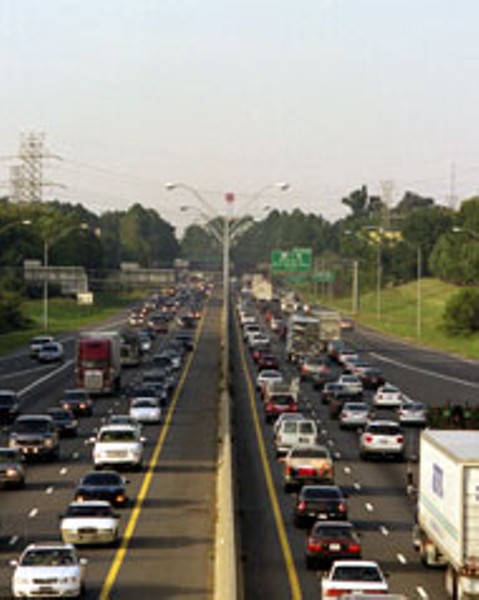Page 4 of 6
These "conversations" could prevent collisions or stop drivers from running off the road, while giving transportation managers an instantaneous view of road and weather conditions. With a DSRC transceiver and GPS technology in every car, automakers believe they can wipe out nearly all automobile fatalities in the US. It's a goal they call the Zero Fatalities Vision.
"There is a basic consensus that we have to change the safety paradigm," said Chris Wilson, Vice President of ITS Strategy and Programs at DaimlerChrysler Research and Technology North America, Inc. "Everything we've done up until now -- airbags, seatbelts -- was to mitigate accidents once they occur. Now we're looking to prevent accidents. To do that we need live vehicle-to-vehicle communication and vehicle-to-vehicle infrastructure."
The tantalizing prospect of saving thousands of lives comes with a heavy price. The same technology that will allow cars to talk to each other in real time would also allow the government and ultimately private business to use the INTI to track every move American drivers make -- and profit from it.
This is the dark side of the information superhighway, the one executives and federal bureaucrats don't like to talk about. That's probably because they know it's entirely possible to use the technology the government is developing to prevent fatal collisions without harvesting information from automobiles and archiving it.
For all their talk about saving lives, there's ample evidence that the driving force behind the push to develop the national information superhighway is to profit from the data it collects. Both the corporations and the government -- including the more than 40 state departments of transportation that are members of ITSA -- stand to eventually rake in billions in revenues if they can bring the system to life. (See sidebar, "A Marketer's Dream.")
But first, they must find a way to harvest and archive the data.
That's where the ADUS, or Archived Data User Service, project comes in. For the last five years, while they were laying the foundation for the INTI, USDOT and ITSA have also begun setting standards for the massive databases that will collect and archive information.
According to federal documents, when it's completed, the brain of the INTI will essentially be a string of interconnected regional and national databases, swapping, processing and storing data on our travels it will collect from devices in our cars.
According to the "ITS Vision Statement" the Federal Highway Administration published in 2003, by 2022, each private "travel customer" will have their own "user profile" on the system that includes regular travel destinations, their route preferences, and any pay-for-service subscriptions they use.
Neil Schuster, president and CEO of ITSA, further clarified that goal in a recent interview with Creative Loafing.
"In fact, when we talk about this, the US government is talking about creating a national database, because where cars are has to go into a database," Schuster said.
Most INTI enthusiasts, like Schuster, insist that the lives potentially saved by this technology are worth giving up some privacy.
"When I get on an airplane everyone in the system knows where I am," said Schuster. "They know which tickets I bought. You could probably go back through United Airlines and find out everywhere I traveled in the last year. Do I worry about that? No. We've decided that airline safety is so important that we're going to put a transponder in every airplane and track it. We know the passenger list of every airplane and we're tracking these things so that planes don't crash into each other. Shouldn't we have that same sense of concern and urgency about road travel? The average number of fatalities each year from airplanes is less than 100. The average number of deaths on the highway is 42,000. I think we've got to enter the debate as to whether we're willing to change that in a substantial way and it may be that we have to allow something on our vehicles that makes our car safer. . . I wouldn't mind some of this information being available to make my roads safer so some idiot out there doesn't run into me."
Schuster insists that drivers shouldn't worry about the government storing information about their travels because personal identifying information would be stripped from it.
"They're not going to archive all of the data, they're going to archive the data they need," Schuster said. "They want origin, they want destination, they want what route that vehicle took. They don't want the personal information that goes with that because it's useless to them."
Schuster's words would be more reassuring if they didn't contradict planning documents authored by his organization and USDOT.



